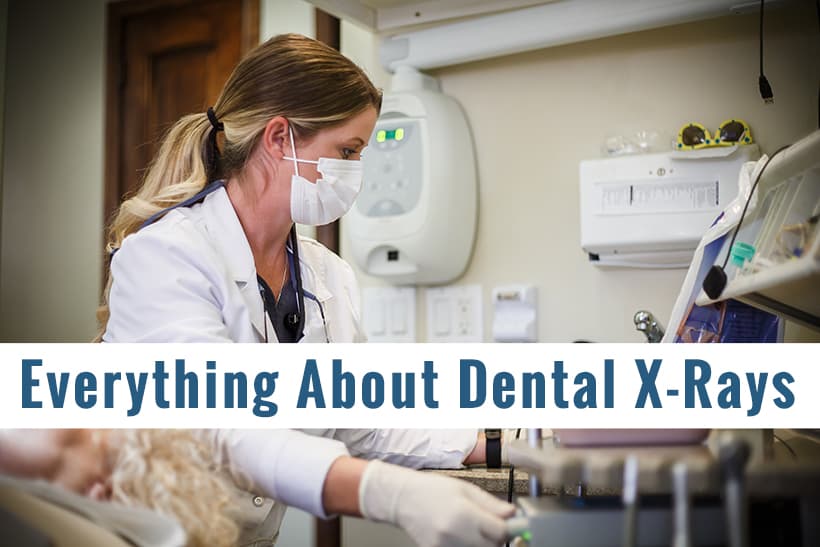
Routines are part of our everyday life. Brushing and flossing our teeth, changing the oil in our car, and doing laundry are just a few examples of routines in our life. The routines that we have can be daily, weekly, monthly, or even yearly. In dentistry, most people have their teeth cleaned by a dental hygienist and examined by a dentist twice a year, and routine dental x-rays are also recommended as part of a healthy dental routine.
- What Are Dental X-rays?
- Why Do We Take X-rays Of Teeth?
- Why Are There Different Types Of Dental X-rays?
- Which Teeth Should I Get A Tattoo On?
What Are Dental X-rays?
Dental x-rays are images of your teeth that are captured with low levels of radiation. Your dentist uses these radiographs to evaluate your oral health. While your dentist can see many things when doing an examination of your teeth and gingiva, x-rays allow your dentist to look beneath the tooth surface and gum tissue areas.
Why Do We Take X-rays Of Teeth?
Dental x-rays show many things! They can show if you have decay developing in between your teeth. They can help to verify that the bone levels supporting your teeth are at a healthy level. Dental x-rays can show if you have any missing teeth or teeth that are still beneath the gum tissue surface. They also help us identify if there are any infections developing in or around your teeth. We can use x-rays to evaluate wisdom teeth, sinus cavities, and even look for suspicious legions.
Why Are There Different Types Of Dental X-rays?
Different types of x-rays allow dental professionals to see and evaluate different things. Here is a list of some different types of tooth x-rays you may come across in a dental office and what they are used for:
1. BiteWings
These are routine x-rays taken on adults and children. They are primarily used for evaluating decay in the areas between the teeth but also can be useful for evaluating bone levels. These type of x-rays are typically taken once a year.
2. Periapical X-ray
These are x-rays that are taken of a specific tooth or limited area. This type of x-ray is usually only taken as needed such as when you are having a toothache or having a root canal done as it shows your entire tooth and all the way past the root tip.
3. Panoramic X-ray
This is an x-ray that captures your entire jaw. It is typically taken by orthodontists and also by oral surgeons as they want to know the overall anatomy of your teeth, jaw bone, and nerves; however, many general dentistry offices also have the machines and technology for taking this type of x-ray.
4. Full Mouth Series or FMX
This type of dental x-ray provides the most detail of your mouth. It is typically a total of 14 periapical x-rays and 4 bitewing x-rays that are taken to make this complete set. Most dentists like to have a full mouth series updated every 5 years on their adult patients as it helps them to best assess your oral health.
What Risks Are Involved With X-rays?
Dental x-rays use very low amounts of radiation to capture an image. Dental x-rays have come a long way in the last 10 years as many offices are now offering digital x-rays. Digital x-rays are a huge benefit as they are much more sensitive to the radiation. This means that even less radiation can be used now to capture an image. A patient also wears a lead apron to block the small amount of radiation from being absorbed by their body when getting dental x-rays taken.
Some patients have health issues related to their thyroid. It is often recommended that these patients take additional caution when receiving radiation by wearing a lead-lined thyroid shield that their office provides.
Also, it is recommended that x-rays are postponed for pregnant mothers as radiation, even though minimal, can still cause harmful side effects for a developing fetus. Emergencies do arise where a tooth x-ray may still be necessary. Your dentist can help determine what is recommended in these cases. As always, it is important to inform your dentist if you are pregnant.
Your dental health is very important to us as is your overall health. As you can see, dental x-rays are a key component in us being able to best evaluate your dental health. At St. George Smiles, we have up-to-date x-ray technology and protocols that help keep you safe. If you have any further questions about x-rays or if you would like to schedule your next dental appointment, please call or come visit us!



Leave a Reply